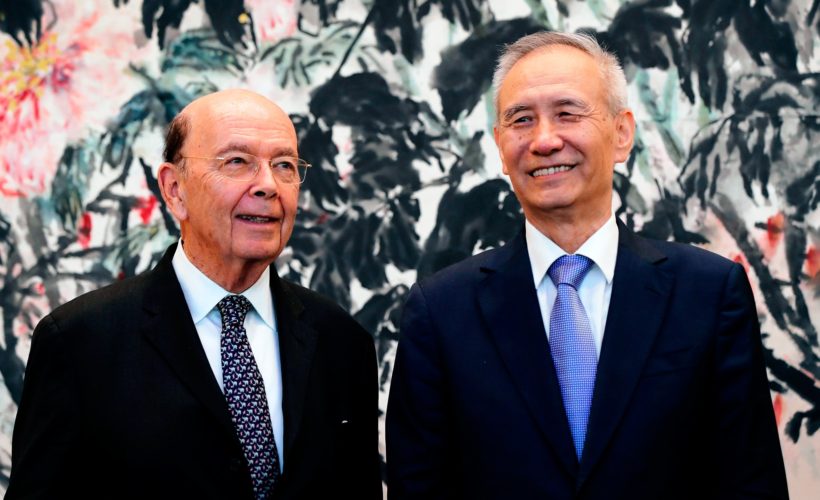The Trump administration just came to an agreement to lift crippling sanctions against Chinese telecommunications giant ZTE. Ending the sanctions banning US companies from selling hardware or software to ZTE could save the company, which announced last month that it had suspended its major operations due to the restrictions. But the tensions between the US and China are far from over.
Congress is investigating both Google and Facebook over their dealings with Huawei and other Chinese firms. Meanwhile, the US memory-chip-maker Micron is among three companies under investigation in China for price fixing. And those are just the latest moves in an ongoing “cold trade war” between the US and China, which constantly threatens to erupt into a full-blown trade war.
But this latest trade news also shows how interconnected the two countries’ economies are, despite escalating tensions between their governments. ZTE’s and Huawei’s products depend heavily on US software, like Google’s mobile operating system, and US made chips, such as those made by Micron. Facebook and Google, meanwhile, depend on Chinese handset manufacturers to distribute their software and reach customers in many parts of the world.
Each move by either country risks not only retaliation from the other but also could put its own companies at risk.
Last year, ZTE admitted to violating US sanctions against Iran and North Korea by selling phones that included US-made hardware and software. It agreed to pay a $900 million fine, fire four high-level employees, and discipline many others. In April, the US Department of Commerce ruled that ZTE hadn’t lived up to its side of the bargain and imposed harsh sanctions banning US companies from selling hardware or software to ZTE.
Then, President Trump announced on Twitter that he wanted to curtail the sanctions, to avoid putting ZTE out of business. Thursday, the Commerce Department announced that ZTE will pay a $1 billion fine in addition to the $900 million already paid, replace its entire board and senior leadership, and put $400 million in escrow to pay future fines if it fails to live up to its promises. ZTE will also allow a team of US “compliance coordinators” to monitor its compliance with US trade laws.
Some members of Congress, including some Republicans, think the administration rolled over too easily. Congress has long feared that Chinese handset and telecommunications infrastructure makers could insert “backdoors” into their products to enable the Chinese government to spy on US citizens, and critics of the ZTE deal argue that Trump should have done more to address that concern.
“This ‘deal’ with #ZTE may keep them from selling to Iran and North Korea,” Senator Marco Rubio (R-Florida) tweeted in response to the news. “That’s good. But it will do nothing to keep us safe from corporate & national security espionage. That is dangerous. Now Congress will need to act to keep America safe from #China.”
This week, The New York Times reported that Facebook shared data with Huawei as part of an agreement to bring the social network to Huawei’s phones. Facebook told the Times Huawei used Facebook user data as part of a “social phone” app that enabled users to access parts of Facebook and that the data was stored on users’ phones, not on Huawei’s servers. Facebook told the paper it would end the deal with Huawei by the end of the week. Following the story, the Senate Committee on Commerce, Science, and Transportation sent Facebook a letter demanding more information about the arrangment. Thursday, Senator Mark Warner (D-Virginia) said he had sent letters to Google’s parent company Alphabet and to Twitter requesting information about the companies’ dealings with Chinese companies.
On one hand, it’s easy to think that the US has the upper hand in this relationship, given the near collapse of ZTE. But experts worry that isolating China could backfire. “Telling ZTE that it can’t buy US technology signals to China that it can be excluded from the US technology market at any time,” Susan Shirk, a former US trade negotiator and chair of the 21st Century China Center at the UC San Diego, told WIRED last month. If China doesn’t have access to suppliers in the US, it will be more motivated to build its own competing products.
China consumes 29 percent of the world’s semiconductors, more than half of which are imported from the US, according to a Commerce Department report. But China is trying to become more of a producer than a consumer of chips through its $20 billion Integrated Circuit Industry Investment Fund.
That’s a concern for companies like Micron, the only remaining North American maker of DRAM chips, which is being investigated for price fixing along with the South Korean companies Samsung and SK Hynix, the only other two major players in the DRAM market.
All this becomes infinitely more complicated given China’s role as an importer of other goods, such as agricultural products, and its importance in helping the US negotiate with North Korea, as Trump prepares to meet Kim Jong-Un next week.
More Great WIRED Stories
- How WIRED lost $100,000 in Bitcoin
- Four rules for learning how to talk to each other again
- Your next glass of wine might be a fake—and you’ll love it
- Maybe DNA can’t answer all our questions about heredity
- Xbox is losing the console war—but that’s a good thing
- Looking for more? Sign up for our daily newsletter and never miss our latest and greatest stories
Source:WIRED











